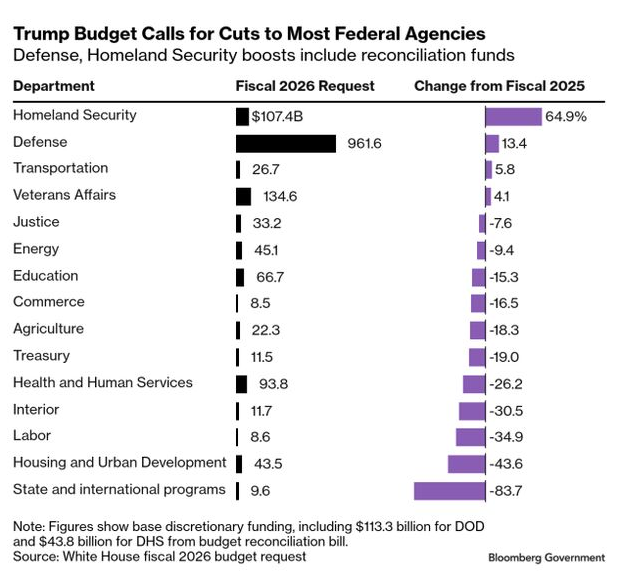President Trump’s Skinny Budget!
President Trump proposed slashing federal spending in his fiscal 2026 budget request, seeking to codify his administration’s efforts to shrink the size of government. The request calls on Congress to reduce nondefense discretionary spending by 17% through an array of cuts to most agencies and by eliminating dozens of programs. Although delivered several months behind schedule, as is typical with new administrations, the proposal also calls for a 13% increase in national security spending, portions of which would be enacted through the Republican’s tax-focused reconciliation package. The House Armed Services, Homeland Security, and Judiciary panels approved portions of the bill to boost funding for military, border security, and other needs. The request, which will not become law but signals the administration’s priorities, marks the first step in the appropriations process for fiscal 2026, which begins October 1st. Appropriators heard from administration officials this week ahead of drafting and debating annual funding bills.
House and Senate Republican Appropriations Leaders are taking different approaches for the FY26 appropriations bills. Chair Cole stated that the House will consider its bills in line with the President’s budget, supporting increased defense spending and shifting some domestic spending toward defense. However, the President’s proposed requests call for flat funding for defense in the appropriation bill, with an additional $119 billion in defense spending included in the budget reconciliation package, totaling $1 trillion for defense—an historic high. Meanwhile, non-defense funding would be cut by nearly 23 percent, excluding extra border security and immigration enforcement funds derived through reconciliation. This approach is not sitting well with Democrats and centrist Republicans, including Senate Appropriations Chair Collins. The Senate is less likely to adhere to President Trump's request. Collins mentioned she has yet to discuss a topline number with ranking member Murray but expressed concern about the non-defense cuts proposed by President Trump, describing them as "extremely difficult to absorb" and highlighting the impact on areas like medical research.

